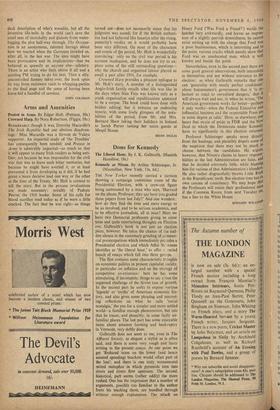Arms and Amenities
REMARKABLE though it was, Dorothy Macardle's The Irish Republic had one obvious disadvan- tage: Miss Macardle was a fervent de Valera supporter. An impartial study of 'the Troubles' has consequently been needed; and Protest in Arms is admirably impartial—so much so that it will appear to many Irish readers as being anti- Dev; not because he was responsible for the civil war that was to leave such bitter memories, but because he might have averted it, or at least prevented it from developing as it did, if he had given a 'more decisive lead one way or the other at the time of the Treaty, Mr. Holt is content to tell the story. But in the process revaluations are made necessary : notably of Padraic Pearse, the 1916 leader. Some of his calls for blood sacrifice read today as if he were a little cracked. The fact that he was right—as things turned out—does not necessarily mean that his judgment was sound; for if the British authori- ties had not behaved like lunatics after the rising, posterity's verdict on it would probably have been very different. On most of the characters and events of tke period, Mr. Holt is wonderfully convincing: only on the civil war period is his account inadequate, and he does not try to ex- plore some of the still outstanding questions— why the 'church and organised labour played so small a part after 1916, for exarhple.
Crowned Harp provides a pleasant epilogue to Mr. Holt's story. A member of a distinguished Anglo-Irish family recalls what life was like in the days when Sinn Fein was known only as a crank organisation and republicanism appeared to be a corpse. The book could have done with brisker editing; but it remains an endearing reverie, with some lively glimpses of the nota- bilities of the period, from Mr. and Mrs. Bernard Shaw taking their holidays in Ireland to Sarah Purser taming her salon guests at Mespil House.
BRIAN INGLIS














































 Previous page
Previous page